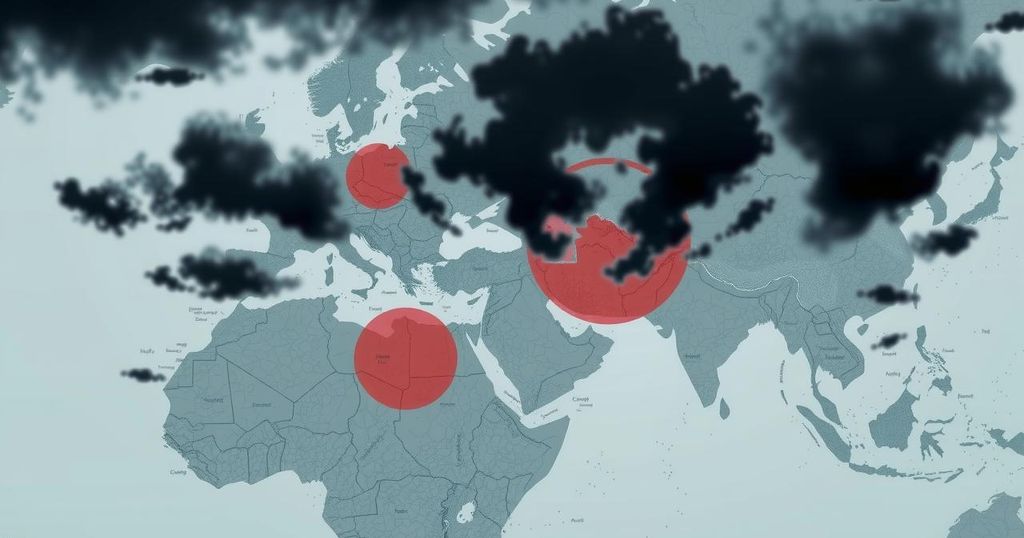The M23 militia, supported by Rwanda, has captured key cities in eastern DRC, significantly altering regional dynamics. This resurgence has led to humanitarian crises and heightened tensions among neighboring countries. International pressure is deemed essential to mitigate the situation and prevent further conflict escalation, with urgent action needed to address the emerging threats.
In late January and early February, the M23 militia seized the key eastern Congolese cities of Goma and Bukavu, gaining control over an area roughly the size of Connecticut. This gain highlights M23 and Rwanda’s determination to alter the geopolitical landscape in Africa’s Great Lakes region. Establishing local administrations further cemented their influence in this strategic territory.
The M23 rebellion initially surfaced in 2012 but was defeated in 2013 due to international pressure, notably from Rwanda. Formally, M23 claims to defend the Rwandophone communities in eastern Congo, primarily the Tutsi. However, its ambitions align closely with the interests of the Rwandan government, particularly following the establishment of the Alliance du Fleuve Congo (AFC), which works towards regime change in Kinshasa.
Upon resurging in November 2021, M23 cited the Congolese government’s unmet commitments to its veterans and fears that its interests were endangered. Rwanda perceives the Democratic Front for the Liberation of Rwanda (FDLR) as a significant threat, alongside substantial economic interests in eastern DRC, particularly in gold mining, which remains a crucial export for Rwanda.
With Uganda and Burundi extending military operations into eastern DRC, Rwanda has sensed the urgency to reactivate the M23 militia to safeguard its interests. Rwanda’s elites have long advocated for a buffer zone in eastern DRC, casting M23 as beneficial in achieving this goal. Reports suggest that Rwandan troops have substantially supported M23 on the ground amidst the militia’s territorial gains.
The offensives by M23 have led to severe humanitarian crises, displacing three million people and resulting in numerous fatalities. Public health emergencies are also emerging, raising concerns about a potential wider regional conflict as tensions in neighboring countries contribute to instability.
Burundian anxieties about potential conflict with Rwanda are escalating. Accusations of rebel support between the two nations have intensified, culminating in the closure of borders and military tensions. President Évariste Ndayishimiye of Burundi has publicly denounced Rwanda, urging preparedness for war, exacerbating the situation.
Uganda, with overlapping interests in the DRC, has maintained a complex relationship with Rwanda. While providing some support to M23, it has simultaneously increased its military presence in eastern DRC, further complicating the regional dynamics as both nations vie for control of the lucrative gold trade.
As President Felix Tshisekedi’s grip on eastern DRC weakens, his military strategies have faced setbacks, particularly following the withdrawal of Burundian support. M23’s movements pose risks to the largely resource-rich Katanga region, prompting complex social and political dynamics among local populations that harbor resentment towards the Kinshasa government.
The escalating conflict threatens to mirror the catastrophic Second Congolese War, which drew neighboring countries into a devastating contest for control of the DRC. Historical patterns of geopolitical partitioning are resurfacing, necessitating urgent international attention.
International pressure, particularly from the United States, proved crucial in resolving the previous M23 crisis. Currently, Tshisekedi is attempting to rekindle such pressure but faces challenges in garnering decisive support, even as he seeks military assistance in exchange for access to DRC’s rich mineral resources.
Although the Biden administration has voiced concerns regarding Rwanda’s involvement with M23 and imposed limited sanctions, additional pressure is essential to encourage Kigali to cease its support. As the situation intensifies, the window for effective international intervention is narrowing, raising alarms over the potential for a broader and deadlier conflict in the Great Lakes region.
In summary, the resurgence of the M23 militia and its backing by Rwanda represents a significant shift in the geopolitics of Africa’s Great Lakes region. The situation has fostered severe humanitarian consequences and increased the risk of escalating regional conflicts, particularly involving Burundi and Uganda. International pressure, particularly from the United States, is critical in curbing Rwanda’s support for M23 and restoring stability in eastern DRC, but the urgency of the situation demands immediate action as the window for intervention closes.
Original Source: responsiblestatecraft.org






